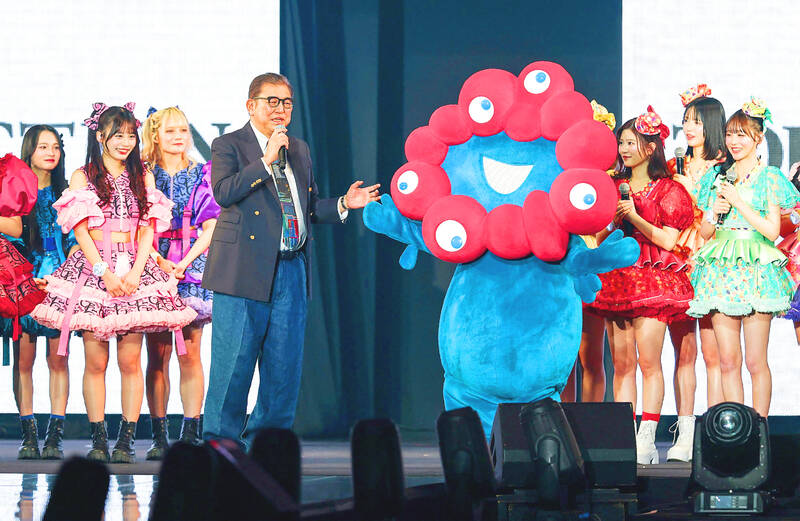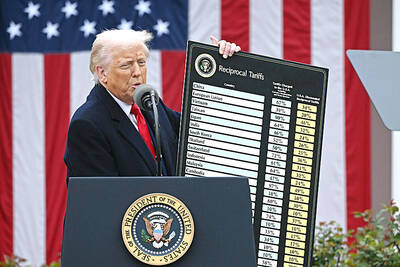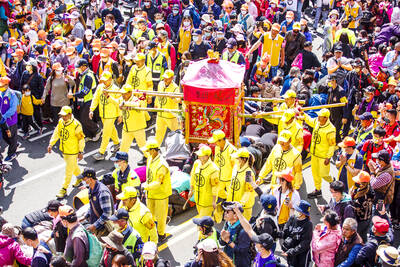A: The World Expo 2025 is set to open in Osaka, Japan, on Sunday, with 158 countries and regions and nine international organizations participating in the event.
B: Wow, what’s the theme this time?
A: The theme is “Designing Future Society for Our Lives.”

Photo: AFP 照片:法新社
B: Do you want to go? How long will it last?
A: It’ll run for 184 days, until Oct. 13. Maybe we can go to Osaka during summer vacation.
A: 2025年世界博覽會預計週日將在日本大阪開幕,158個國家或地區及9大國際組織將參與盛會!
B: 哇這次的主題是什麼?
A: 主題是:「創造閃耀生命光輝的未來社會」。
B: 你想要去嗎?展出多久啊?
A: 世博會共展出184天到10月13日,或許我們暑假時可以去大阪玩。
(By Eddy Chang, Taipei Times/台北時報張迪)

US President Donald Trump is taking a blowtorch to the rules that have governed world trade for decades. The “reciprocal’’ tariffs that he announced Wednesday last week are likely to create chaos for global businesses and conflict with America’s allies and adversaries alike. Since the 1960s, tariffs — or import taxes — have emerged from negotiations between dozens of countries. Trump wants to seize the process. “Obviously, it disrupts the way that things have been done for a very long time,’’ said Richard Mojica, a trade attorney at Miller & Chevalier. “Trump is throwing that out the window ... Clearly this is

The Matsu pilgrimage is one of Taiwan’s most iconic annual religious events. This grand occasion is more than just a religious ceremony; it deeply reflects Taiwan’s history and culture. Originally, Matsu was the goddess of the sea, primarily responsible for protecting fishermen and ensuring their safe voyage. As immigrants brought Matsu worship to Taiwan, she gradually evolved into a deity overseeing health, business, and various aspects of life. In times of uncertainty, Matsu has become a vital source of spiritual comfort for the Taiwanese. The pilgrimage represents Matsu’s annual tour to inspect her domain, driving away evil and bringing

A: The World Expo 2025 is set to open in Osaka, Japan, on Sunday, with 158 countries and regions and nine international organizations participating in the event. B: Wow, what’s the theme this time? A: The theme is “Designing Future Society for Our Lives.” B: Do you want to go? How long will it last? A: It’ll run for 184 days, until Oct. 13. Maybe we can go to Osaka during summer vacation. A: 2025年世界博覽會預計週日將在日本大阪開幕,158個國家或地區及9大國際組織將參與盛會! B: 哇這次的主題是什麼? A: 主題是:「創造閃耀生命光輝的未來社會」。 B: 你想要去嗎?展出多久啊? A: 世博會共展出184天到10月13日,或許我們暑假時可以去大阪玩。 (By Eddy Chang, Taipei Times/台北時報張迪)

Dos & Don’ts — 想想看,這句話英語該怎麼說? 1. 我臥病三天。 ✔ I stayed in bed for three days. ✔ I kept to my bed for three days. χ I slept in my bed for three days. 註︰動詞 sleep 通常作「睡眠」解。例如:Usually we sleep eight hours a day. 「因病臥床」應用 to stay in bed 或 to keep to one’s bed. 2. 彼得容易傷風。 ✔ Peter is liable to colds (或to catch cold). ✔ Peter is subject to colds. χ Peter is easy to catch cold. 註︰easy 常用於事,可以說 English is easy to learn. 或 It is easy to learn English.,但不可以說 I am easy to learn English.。因為 easy 很少用於人,尤其用來指「容易」的場合。除非用在 an easy person 中,easy 在此意思是「隨和」。 另外,可以說 “It is easy to misuse the article.”